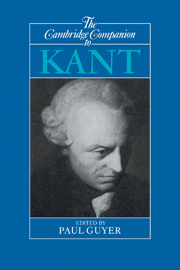Book contents
- Frontmatter
- Introduction
- 1 Kant's intellectual development
- 2 The Transcendental Aesthetic
- 3 Functions of thought and the synthesis of intuitions
- 4 The transcendental deduction of the categories
- 5 Causal laws and the foundations of natural science
- 6 Empirical, rational, and transcendental psychology
- 7 Reason and the practice of science
- 8 The critique of metaphysics
- 9 Vindicating reason
- 10 Autonomy, obligation, and virtue
- 11 Politics, freedom, and order
- 12 Taste, sublimity, and genius
- 13 Rational theology, moral faith, and religion
- 14 The first twenty years of critique
- Bibliography
- Index
3 - Functions of thought and the synthesis of intuitions
Published online by Cambridge University Press: 28 May 2006
- Frontmatter
- Introduction
- 1 Kant's intellectual development
- 2 The Transcendental Aesthetic
- 3 Functions of thought and the synthesis of intuitions
- 4 The transcendental deduction of the categories
- 5 Causal laws and the foundations of natural science
- 6 Empirical, rational, and transcendental psychology
- 7 Reason and the practice of science
- 8 The critique of metaphysics
- 9 Vindicating reason
- 10 Autonomy, obligation, and virtue
- 11 Politics, freedom, and order
- 12 Taste, sublimity, and genius
- 13 Rational theology, moral faith, and religion
- 14 The first twenty years of critique
- Bibliography
- Index
Summary
The Transcendental Analytic of the Critique of Pure Reason has three main sections: the Metaphysical Deduction, the Transcendental Deduction, and the Analytic of Principles. The second and third sections have spawned much lively controversy, both interpretive and substantive. The first, by contrast, has generated little interest. Most readers have thought it clear what Kant means to establish here, and how. Most have also thought it plain that his argument is a failure, unworthy of continued exploration.
I will not try to defend the argument of the Metaphysical Deduction. I will try to show that this section of the Critique contains material of considerable importance, however. First I will summarize Kant's argument (I) and review some of the difficulties with it (II). Then I will discuss the notion of synthesis, trying to show that the Metaphysical Deduction helps to shed light on this important but otherwise obscure notion (III). Finally, I will comment briefly on the central contention of the Metaphysical Deduction (IV).
- Type
- Chapter
- Information
- The Cambridge Companion to Kant , pp. 101 - 122Publisher: Cambridge University PressPrint publication year: 1992
- 20
- Cited by



